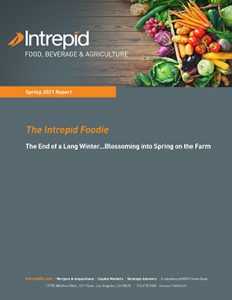Things Are Finally Looking Up for the Farm Economy
In this issue of the Intrepid Foodie, we will primarily focus on the farm economy and rural America, which, for the first time in several years, is seeing prospects for rising crop prices and farm incomes after years of trade battles, price stagnation, and government supports.
In the food chain, it all starts on the farm. While the latest hot brand of snack product or beverage garners significant mindshare and Super Bowl ads, the agriculture sector has recently grabbed its own headlines as basic commodities (e.g., wheat, corn, soy, and sugar) are up more than 20% from a year ago. Moreover, there is talk of a coming agriculture supercycle. There have been several high profile, high valuation transactions in areas of sustainable agriculture such as the Vital Farms IPO and the AppHarvest merger with a SPAC (special purpose acquisition company). Even as we write this issue, another high profile deal was announced between AeroFarms and another SPAC.
 These new models of agriculture (i.e., pasture-raised livestock, controlled environment produce) will likely become an increasing part of the food supply, but they will not take the place of traditional agriculture in the U.S. It is not about lining up on one side or the other of agriculture, but a coexistence where both models, traditional and sustainable, influence each other and make each other better. Traditional agriculture’s lower prices push sustainable agriculture to become more and more efficient in order to lower costs to an acceptable premium consumers are willing to pay. Sustainable agriculture’s message and consumer support push traditional agriculture to be more mindful and incrementally improve issues such as animal welfare and resource usage.
These new models of agriculture (i.e., pasture-raised livestock, controlled environment produce) will likely become an increasing part of the food supply, but they will not take the place of traditional agriculture in the U.S. It is not about lining up on one side or the other of agriculture, but a coexistence where both models, traditional and sustainable, influence each other and make each other better. Traditional agriculture’s lower prices push sustainable agriculture to become more and more efficient in order to lower costs to an acceptable premium consumers are willing to pay. Sustainable agriculture’s message and consumer support push traditional agriculture to be more mindful and incrementally improve issues such as animal welfare and resource usage.
New models of agriculture also offer the potential for more economic opportunities in rural America. Rural poverty, the opioid crisis, and a growing urban/rural divide are all issues that have come into focus in the broader consciousness over the past several years, but they have always been a part of my family history. My father’s side of the family came to this country and settled in West Virginia to work in its coal mines around the turn of the century. My father was the first in his family to go to college and “get out.” On my trips to Fairmont, W.Va. over the years, I have seen the progressive decline of his hometown. Companies like AppHarvest are looking to invest in Appalachia. They offer the prospect of new growth industries that take advantage of the workforce, Appalachia’s proximity to Eastern markets, and its natural resources to replace reliance in the region on industries experiencing secular decline.
Managing Director


